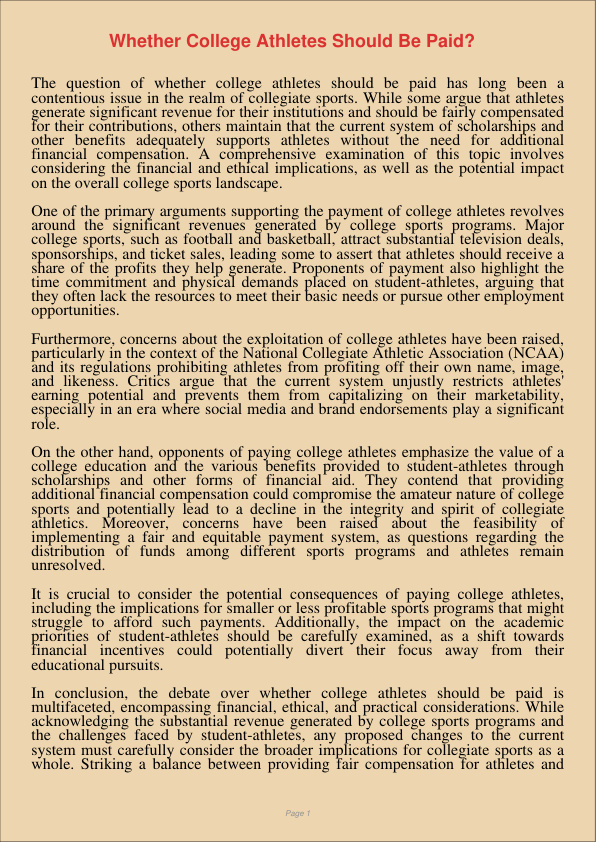Whether College Athletes Should Be Paid
Dec 31, 2023
whether college athletes
paid
Management
Law

The question of whether college athletes should be paid has long been a contentious issue in the realm of collegiate sports. While some argue that athletes generate significant revenue for their institutions and should be fairly compensated for their contributions, others maintain that the current system of scholarships and other benefits adequately supports athletes without the need for additional financial compensation. A comprehensive examination of this topic involves considering the financial and ethical implications, as well as the potential impact on the overall college sports landscape.
One of the primary arguments supporting the payment of college athletes revolves around the significant revenues generated by college sports programs. Major college sports, such as football and basketball, attract substantial television deals, sponsorships, and ticket sales, leading some to assert that athletes should receive a share of the profits they help generate. Proponents of payment also highlight the time commitment and physical demands placed on student-athletes, arguing that they often lack the resources to meet their basic needs or pursue other employment opportunities.
Furthermore, concerns about the exploitation of college athletes have been raised, particularly in the context of the National Collegiate Athletic Association (NCAA) and its regulations prohibiting athletes from profiting off their own name, image, and likeness. Critics argue that the current system unjustly restricts athletes’ earning potential and prevents them from capitalizing on their marketability, especially in an era where social media and brand endorsements play a significant role.
On the other hand, opponents of paying college athletes emphasize the value of a college education and the various benefits provided to student-athletes through scholarships and other forms of financial aid. They contend that providing additional financial compensation could compromise the amateur nature of college sports and potentially lead to a decline in the integrity and spirit of collegiate athletics. Moreover, concerns have been raised about the feasibility of implementing a fair and equitable payment system, as questions regarding the distribution of funds among different sports programs and athletes remain unresolved.
It is crucial to consider the potential consequences of paying college athletes, including the implications for smaller or less profitable sports programs that might struggle to afford such payments. Additionally, the impact on the academic priorities of student-athletes should be carefully examined, as a shift towards financial incentives could potentially divert their focus away from their educational pursuits.
In conclusion, the debate over whether college athletes should be paid is multifaceted, encompassing financial, ethical, and practical considerations. While acknowledging the substantial revenue generated by college sports programs and the challenges faced by student-athletes, any proposed changes to the current system must carefully consider the broader implications for collegiate sports as a whole. Striking a balance between providing fair compensation for athletes and preserving the integrity and educational mission of college athletics remains a complex and ongoing challenge. A thorough and nuanced approach that accounts for the diverse perspectives and interests involved is necessary to address this complex issue effectively.